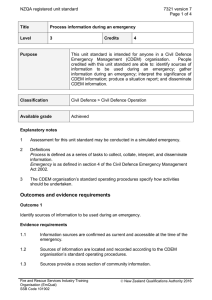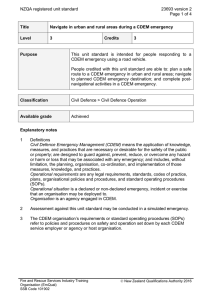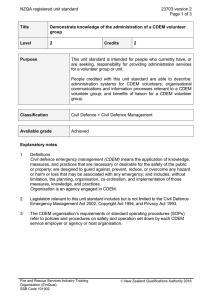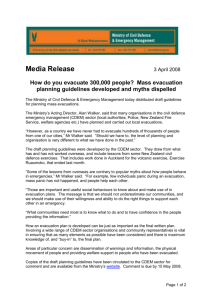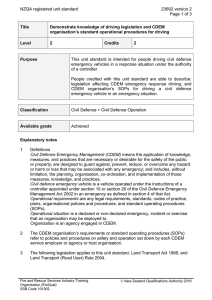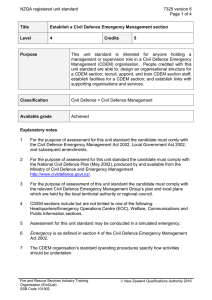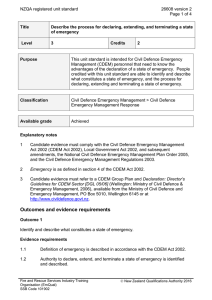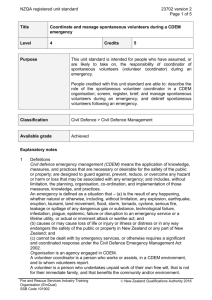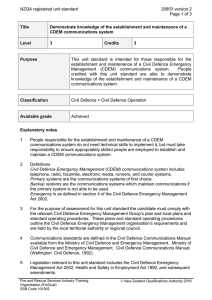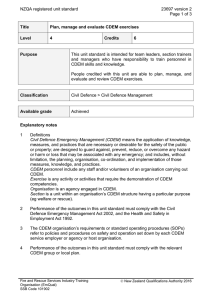NZQA registered unit standard 23701 version 2 Page 1 of 5
advertisement
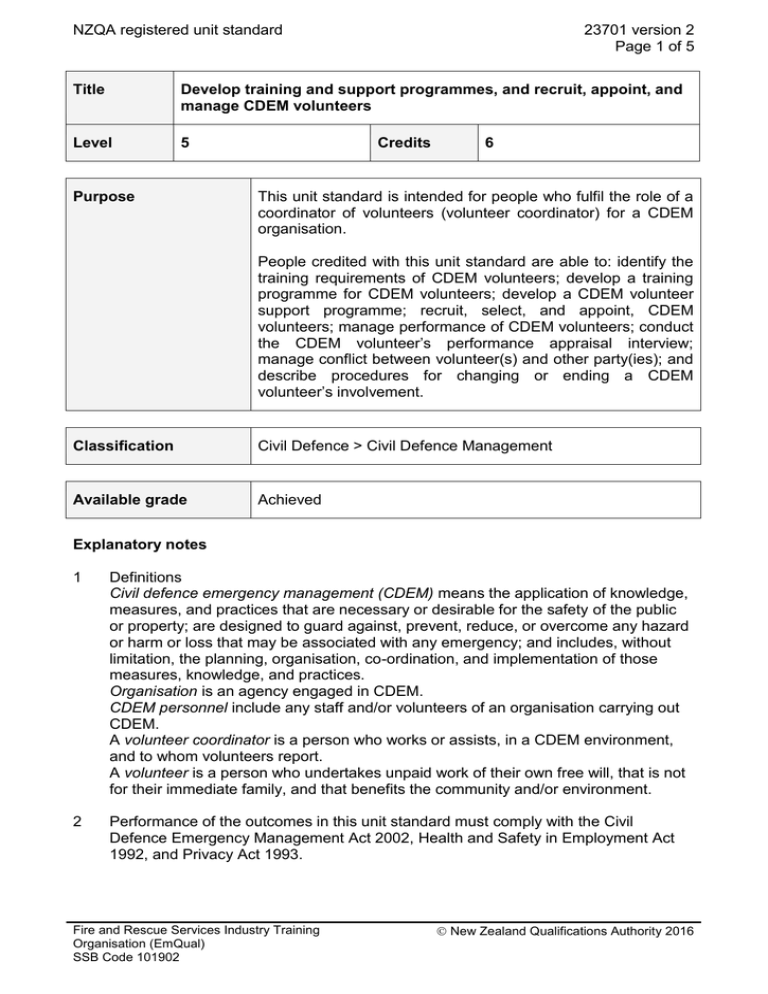
NZQA registered unit standard 23701 version 2 Page 1 of 5 Title Develop training and support programmes, and recruit, appoint, and manage CDEM volunteers Level 5 Purpose Credits 6 This unit standard is intended for people who fulfil the role of a coordinator of volunteers (volunteer coordinator) for a CDEM organisation. People credited with this unit standard are able to: identify the training requirements of CDEM volunteers; develop a training programme for CDEM volunteers; develop a CDEM volunteer support programme; recruit, select, and appoint, CDEM volunteers; manage performance of CDEM volunteers; conduct the CDEM volunteer’s performance appraisal interview; manage conflict between volunteer(s) and other party(ies); and describe procedures for changing or ending a CDEM volunteer’s involvement. Classification Civil Defence > Civil Defence Management Available grade Achieved Explanatory notes 1 Definitions Civil defence emergency management (CDEM) means the application of knowledge, measures, and practices that are necessary or desirable for the safety of the public or property; are designed to guard against, prevent, reduce, or overcome any hazard or harm or loss that may be associated with any emergency; and includes, without limitation, the planning, organisation, co-ordination, and implementation of those measures, knowledge, and practices. Organisation is an agency engaged in CDEM. CDEM personnel include any staff and/or volunteers of an organisation carrying out CDEM. A volunteer coordinator is a person who works or assists, in a CDEM environment, and to whom volunteers report. A volunteer is a person who undertakes unpaid work of their own free will, that is not for their immediate family, and that benefits the community and/or environment. 2 Performance of the outcomes in this unit standard must comply with the Civil Defence Emergency Management Act 2002, Health and Safety in Employment Act 1992, and Privacy Act 1993. Fire and Rescue Services Industry Training Organisation (EmQual) SSB Code 101902 New Zealand Qualifications Authority 2016 NZQA registered unit standard 23701 version 2 Page 2 of 5 3 The CDEM organisation’s requirements or standard operating procedures (SOPs) refer to policies and procedures on safety and operation set down by each CDEM service employer or agency or host organisation. 4 Assessment against this unit standard may be conducted in a simulated emergency. 5 Compliance with the CDEM organisation’s health and safety policy and procedures is mandatory. Outcomes and evidence requirements Outcome 1 Identify the training requirements of CDEM volunteers. Evidence requirements 1.1 Training needs are identified in accordance with the CDEM organisation’s requirements. 1.2 Training standards and levels of proficiency are identified in accordance with the CDEM organisation’s requirements. 1.3 An annual training plan is developed with training needs prioritised in accordance with the CDEM organisation’s requirements. Outcome 2 Develop a training programme for CDEM volunteers. Evidence requirements 2.1 Training programmes for CDEM volunteers are developed in accordance with the organisation’s requirements. Range 2.2 may include but is not limited to – operational needs, communication, support networks, administration procedures, legal requirements of the organisation and implications for individuals, safety procedures, resources, facilities. Training provider(s) is selected on the basis of the identified training needs and in accordance with the organisation’s requirements. Fire and Rescue Services Industry Training Organisation (EmQual) SSB Code 101902 New Zealand Qualifications Authority 2016 NZQA registered unit standard 23701 version 2 Page 3 of 5 Outcome 3 Develop a CDEM volunteer support programme. Range may include but is not limited to – recognition, reward, motivation, stress management, health and safety. Evidence requirements 3.1 Volunteers’ support needs are identified in accordance with the CDEM organisation’s requirements. 3.2 CDEM volunteer support programme is developed to meet identified support needs. Outcome 4 Recruit, select, and appoint CDEM volunteers. Evidence requirements 4.1 The requirements for personnel are identified in accordance with the CDEM structure. 4.2 Recruitment of CDEM volunteers is in accordance with the CDEM organisation’s requirements. 4.3 Selection of volunteers is in accordance with the CDEM organisation’s requirements. 4.4 Appointment of volunteers is in accordance with the CDEM organisation’s requirements. Outcome 5 Manage performance of CDEM volunteers. Evidence requirements 5.1 Agreed tasks, responsibilities, and required performance standards are formally documented in accordance with the CDEM organisation’s requirements. 5.2 Agreed performance standards specify the activities to be performed and the standard to which they are to be performed. 5.3 Assessment of performance identifies: achievements against the required performance standards; areas where improvements in performance are required; and methods to achieve these improvements. Fire and Rescue Services Industry Training Organisation (EmQual) SSB Code 101902 New Zealand Qualifications Authority 2016 NZQA registered unit standard 23701 version 2 Page 4 of 5 Outcome 6 Conduct the CDEM volunteer’s performance appraisal interview. Evidence requirements 6.1 Time, place, and format for performance appraisal are determined in consultation with the volunteer. 6.2 Documentation to be used during the performance appraisal is prepared with copies available for the volunteer in accordance with the CDEM organisation’s requirements. 6.3 Interview is conducted and documented in accordance with the CDEM organisation’s requirements. Outcome 7 Manage conflict between volunteer(s) and other party(ies). Range may include but is not limited to – differences of opinion, personal animosity, expression of sexism and racism, inappropriate voice modulation and use of language, non-compliance with organisational and/or team norms and values. Evidence requirements 7.1 Issues contributing to interpersonal conflict are identified and clarified to minimise negative effect on individuals and groups in accordance with the CDEM organisation’s requirements. 7.2 Methods used to identify and clarify conflict take into account the views of opposing party(ies). 7.3 Conflict solutions meet the needs of identified individuals, and/or groups, and the organisation, and satisfy all legal requirements. 7.4 Conflict is resolved in a way that avoids offence and maintains respect for all parties. Outcome 8 Describe procedures for changing or ending a CDEM volunteer’s involvement. Evidence requirements 8.1 Description identifies the reason(s) for changing a volunteer’s involvement. 8.2 Description identifies the reason(s) for ending a volunteer’s involvement, and any legal implications related to ending the volunteer’s involvement. 8.3 Procedures for exit interviews are described in accordance with the CDEM organisation’s requirements. Fire and Rescue Services Industry Training Organisation (EmQual) SSB Code 101902 New Zealand Qualifications Authority 2016 NZQA registered unit standard Planned review date 23701 version 2 Page 5 of 5 31 August 2014 Status information and last date for assessment for superseded versions Process Version Date Last Date for Assessment Registration 1 23 April 2007 N/A Rollover and Revision 2 18 July 2013 N/A Consent and Moderation Requirements (CMR) reference 0223 This CMR can be accessed at http://www.nzqa.govt.nz/framework/search/index.do. Please note Providers must be granted consent to assess against standards (accredited) by NZQA, before they can report credits from assessment against unit standards or deliver courses of study leading to that assessment. Industry Training Organisations must be granted consent to assess against standards by NZQA before they can register credits from assessment against unit standards. Providers and Industry Training Organisations, which have been granted consent and which are assessing against unit standards must engage with the moderation system that applies to those standards. Requirements for consent to assess and an outline of the moderation system that applies to this standard are outlined in the Consent and Moderation Requirements (CMR). The CMR also includes useful information about special requirements for organisations wishing to develop education and training programmes, such as minimum qualifications for tutors and assessors, and special resource requirements. Comments on this unit standard Please contact the Fire and Rescue Services Industry Training Organisation (EmQual) info@emqual.org.nz if you wish to suggest changes to the content of this unit standard. Fire and Rescue Services Industry Training Organisation (EmQual) SSB Code 101902 New Zealand Qualifications Authority 2016
